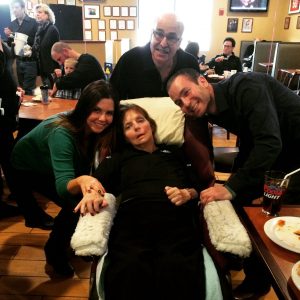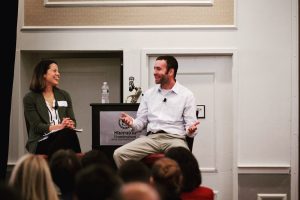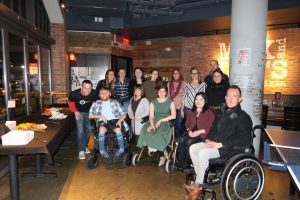‘Our Odyssey’ Nonprofit Connects Young Adults Who Have Rare Diseases
Written by |

Young adults gather at the Our Odyssey meet-up in Boston. (Photo courtesy Seth Rotberg)
As a high-school student in the suburbs of Boston, Seth Rotberg watched his mother’s mental and physical health deteriorate because of Huntington’s disease. Rotberg was embarrassed to go out in public. People would stare, despite the 15-year-old’s best attempts to explain that her drunk-like movements were caused by a fatal neurodegenerative disorder.
“I was in denial when I first learned about it,” Rotberg told Huntington’s Disease News by phone, adding that he was more focused on fitting in with his friends from school.
As Rotberg matured — eventually testing positive for the same disease that killed his mother — he got involved with other people who have Huntington’s. Eventually, he established Our Odyssey, a nonprofit group devoted to connecting young adults with rare conditions.
Huntington’s disease is a rare genetic disorder caused by a mutation in the huntingtin (HTT) gene. It is characterized by uncontrolled jerking, writhing movements known as chorea, loss of thinking ability, and psychiatric problems. Patients typically die 15 to 20 years after advanced symptoms appear.
In a January 2018 TEDx talk in Natick, Massachusetts, Rotberg said Huntington’s was like having ALS, Alzheimer’s and Parkinson’s all at the same time.
Rotberg also spoke about Our Odyssey during a Feb. 20 webinar sponsored by the National Organization for Rare Disorders (NORD).
Rotberg, 29, is a patient engagement manager at Inspire, a for-profit company that manages an online patient forum and social network. Similar to his role as head of strategy and engagement at Our Odyssey, Rotberg coordinates patient meet-ups for 200 rare and chronic disease communities.
Our Odyssey seeks to reduce social isolation among rare-disease patients aged 18 to 35 through meetings across the country.
Becoming a patient advocate
“Even though we live with different conditions, ultimately we are dealing with similar challenges,” Rotberg said. His goal: “Eliminate the stigma behind trying to fit in with your peers or feeling pressured by society to be someone you aren’t.”
So far, the organization has held events in Philadelphia, Boston and Washington, D.C. Virtual meet-ups are scheduled for March 25 and March 29.
The idea for Our Odyssey started circulating in Rotberg’s head before he earned his master’s in nonprofit management from DePaul University in 2018. Rotberg met co-founder Kristina Wolfe in January 2019; together, they established Our Odyssey five months later.
The organization has no salaried employees. Rotberg said it relies on volunteers and assistance from Our Odyssey’s board, though he hopes that might change. Anna Laurent, diagnosed with Alagille syndrome as a child, plays a large role in running the organization as its head of programming and initiatives.
While Rotberg admits he doesn’t make a lot of time for himself, he loves connecting with other leaders who deal with rare and chronic diseases. One friend jokingly refers to him as Seth the Connector. Having a ticking clock for when his symptoms might appear adds extra stress.
“Even if I seem happy and hopeful and everything, I have my bad days, my tough weeks when I have to deal with anxious thoughts or stress or worrying about the future,” said Rotberg, adding that he sees a therapist regularly.
Rotberg’s first foray into Huntington’s disease advocacy came during his freshman year at the University of Massachusets (UMass) Amherst. The university was near his home in the outskirts of Boston — but far enough away to have the independent college living experience.
He and a friend created a three-on-three basketball tournament, Hoops for Huntington’s, to raise money for research into the condition. Testing positive for Huntington’s his second year of college took him by surprise, despite having a 50% chance of inheriting the disorder from his mother.
“I was shocked,” Rotberg said in the TEDx speech. For two years, he refrained from telling family members, who thought he became more involved with patient advocacy work because of his mother.
Expanding Our Odyssey
Both the Huntington’s Disease Youth Organization (HDYO) and Huntington’s Disease Society of America (HDSA) provided a space for Rotberg to be himself in the company of others like him.
“I could connect with young adults in the Huntington’s disease space on a personal level without having to explain myself because they understood it,” Rotberg said.
Rotberg has been a HDYO board member for three years. He was a volunteer and president of the Massachusetts and Rhode Island chapter of HDSA during his college years.
At the Global Genes RARE Patient Advocacy Summit in 2018, Rotberg not only spoke, but also rounded up other young adults in attendance to stage the first Our Odyssey meet-up before it had a name.
One in 10 Americans have a rare disease, and many suffer from isolation. A recent study shows that 42% of people with rare diseases reported feeling depressed. Rotberg intends to change that.
Rotberg wants to get more funding to expand meet-ups around the world — not just in the northeastern U.S. — create a mentorship program, and let young adults share their stories through public speaking and media opportunities.
He’s looking to expand without “going too crazy,” spreading himself and Our Odyssey thin. That idea echoes the advice he gave in the NORD webinar for new organizations: focus on creating a few high-quality events rather than a bunch of superficial ones.
While Rotberg’s future with Huntington’s is unknown, the tattoo emblazoned across his shoulders and on his friend James Hoffman’s headstone, who died from an apartment fire at UMass Amherst, pushes him forward.
“Live as if you were going to die tomorrow,” it says. “Learn as if you were to live forever.”








